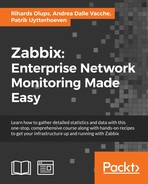 Backups
by Andrea Vacche, Patrik Uytterhoeven, Rihards Olups
Zabbix: Enterprise Network Monitoring Made Easy
Backups
by Andrea Vacche, Patrik Uytterhoeven, Rihards Olups
Zabbix: Enterprise Network Monitoring Made Easy
- Zabbix: Enterprise Network Monitoring Made Easy
- Table of Contents
- Zabbix: Enterprise Network Monitoring Made Easy
- Zabbix: Enterprise Network Monitoring Made Easy
- Credits
- Preface
- I. Module 1
- 1. Getting Started with Zabbix
- The first steps in monitoring
- Zabbix features and architecture
- Installation
- Summary
- 2. Getting Your First Notification
- 3. Monitoring with Zabbix Agents and Basic Protocols
- 4. Monitoring SNMP Devices
- 5. Managing Hosts, Users, and Permissions
- 6. Detecting Problems with Triggers
- 7. Acting upon Monitored Conditions
- 8. Simplifying Complex Configurations with Templates
- 9. Visualizing Data with Graphs and Maps
- 10. Visualizing Data with Screens and Slideshows
- 11. Advanced Item Monitoring
- 12. Automating Configuration
- 13. Monitoring Web Pages
- 14. Monitoring Windows
- 15. High-Level Business Service Monitoring
- 16. Monitoring IPMI Devices
- 17. Monitoring Java Applications
- 18. Monitoring VMware
- 19. Using Proxies to Monitor Remote Locations
- 20. Encrypting Zabbix Traffic
- 21. Working Closely with Data
- 22. Zabbix Maintenance
- A. Troubleshooting
- B. Being Part of the Community
- 1. Getting Started with Zabbix
- II. Module 2
- 1. Zabbix Configuration
- 2. Getting Around in Zabbix
- 3. Groups, Users, and Permissions
- 4. Monitoring with Zabbix
- Introduction
- Active agents
- Passive agents
- Extending agents
- SNMP checks
- Internal checks
- Zabbix trapper
- IPMI checks
- JMX checks
- Aggregate checks
- External checks
- Database monitoring
- Checks with SSH
- Checks with Telnet
- Calculated checks
- Building web scenarios
- Monitoring web scenarios
- Some advanced monitoring tricks
- Autoinventory
- 5. Testing with Triggers in Zabbix
- 6. Working with Templates
- 7. Data Visualization and Reporting in Zabbix
- 8. Monitoring VMware and Proxies
- 9. Autodiscovery
- 10. Zabbix Maintenance and API
- C. Upgrading and Troubleshooting Zabbix
- III. Module 3
- 1. Deploying Zabbix
- 2. Distributed Monitoring
- 3. High Availability and Failover
- Understanding high availability
- Understanding the levels of IT service
- Some considerations about high availability
- Implementing high availability on a web server
- Configuring the Zabbix server for high availability
- Implementing high availability for a database
- Summary
- 4. Collecting Data
- 5. Visualizing Data
- 6. Managing Alerts
- 7. Managing Templates
- 8. Handling External Scripts
- 9. Extending Zabbix
- 10. Integrating Zabbix
- D. Bibliography
- Index
Once you have your Zabbix server up and running, it's important to back up your Zabbix configuration in case you should run into problems. In this topic, we will cover what we need to backup and how to do it. While it's not really a recipe on how to backup as each Zabbix set up is different and not everybody uses MySQL or PostgreSQL, we will show you how to run your backups.
In the crontab of your server, add the following line:
1 0 * * * mysqldump -u <user> -p<password> <zabbixdb> > /backup/zabbix_db_backup
This recipe showed a basic backup of the MySQL database of our Zabbix server. When we backup Zabbix, it depends on what database we have used to do our backup. To avoid locking, it is possible to make use of tools such as Percona XtraBackup. When you work with PostgreSQL, you could make use of the pg_dump utility.
The database is the most important backup in Zabbix, as all information is stored in the database. In this example, we have a backup running every night 1 minute after midnight to the volume / backup. This volume can be a volume mounted on a different server or NAS.
This backup solution is not perfect but works in small Zabbix setups. It's actually far from perfect as it will create some heavy loads in bigger setups. For those setups, there are other solutions, such as database replication or a dump excluding the history and the trends table as it's the tables that take up a lot of space and time to dump.
Another solution could be to write a small script that does the database dump and checks if the dump was OK and monitor this output with Zabbix to get notified in case of issues.
Also important to remember is to backup your frontend files in case you have tweaked your frontend. Another important thing to backup is your zabbix_server.conf file as it will probably change during time. Same goes for the agents and the proxy servers in your network.
The backup of those files is not a Zabbix job. For this, you have your trustworthy backup softwares such as Zmanda, Bacula, and so on. However, it could be useful to create your script so that it collects all files in one .tar.gz file.
If you make use of mysqldump program, make sure you add some options such as --single-transaction to avoid database locking. Having a backup of your externalscripts directory can come in handy.
Making a backup of your templates by exporting them in Zabbix can also be easy later when you want to install a new Zabbix server or a Zabbix server for testing.
-
No Comment